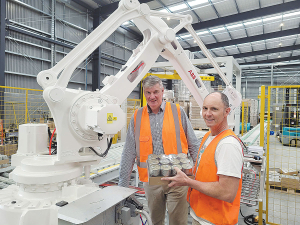Riverland Foods Limited says the plant, which was set to start production about the end of February, would produce 30 million cans of high-value cat and dog food annually, adding significantly to an industry generating over $NZ300 million in yearly exports.
Riverland describes it as a first for New Zealand, producing exclusively for client brands.
General manager Michael Dance said it would remove a logjam that limited New Zealand as a go-to destination for third-party manufacturing.
He said other plants are either very small and running at full capacity making their own brands, or in long-term contracts for a small number of large clients.
The Riverland plant was a high speed, high volume line that is attractive to established global players.
"Previously these types of companies would not have considered sourcing from New Zealand. The impact for farmers in terms of upstream impact is a growth in demand for what might traditionally be viewed as low value or possibly waste stream product.
"So good news in terms of lifting the overall yield per kg from an animal."
Dance said that not producing their own brand gave Riverland a real point of difference.
"All customers are treated equally. It also provides us with flexibility to meet the changing market demands such as different product textures and formulations."
Dance said they deal with the major meat processors for their supply but being South Island based gave greater flexibility with the raw materials.
“The most obvious example of this is our ability to handle fresh meats as opposed to frozen.
This removes a costly step for meat processors and also provides us with a better quality ingredient that hasn’t suffered from severe temperature degradation,” said Dance.
“By working with industry we also believe we can add value to waste streams both on the farm and in the wider environment.”
The plant has been established by a team with broad experience in meat processing and pet food production including head of operations Tom Coughlan, who says he is looking forward to providing high-quality cat and dog food made from the best ingredients in the South Island, adding that Canterbury is a strategic location for New Zealand’s top meat processors.
“We chose Christchurch because of its proximity to processing plants and quality raw materials.”
Dance also sees great potential in using pest animals as a meat source.
“Pest eradication is an area I am personally very interested in.
“I’d like to work with both government and industry to create a financial incentive for supply of possums, wallabies, rabbits, all of which are very useful and desirable in overseas markets.”
The company is keen to work with local research institutions such as Lincoln and Massey to develop new products and production processes.
“This is something we are well placed to do as we have our own in- house R&D facilities and pilot plant,” said Dance.
“Riverland’s ability to make many different textures gives brand owners the opportunity to hold on to their customers within their brand.”
Dance said initial investment in the project exceeds $NZ30 million but further funds are committed for future staged development.
Over 95% of the plant’s output is expected to go to export.
Pet Food Association executive director Richard Brake said the addition of world-class production capacity was very welcome.
Pet food exports have quadrupled in less than a decade, increasing from $75 million a year in 2014 to $320 million in 2023.
“Retail-ready petfood exports have been growing very strongly for some time. Growth is at 17.4% into North America and 25.3% into Asia,” said Brake.
“A recent plateau in exports was caused by production capacity constraints and most recently the effects of Cyclone Gabrielle on East Coast manufacturers, but the addition of Riverland’s factory will further boost New Zealand pet food exports.”

















